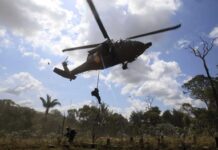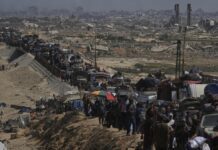
A Bhutanese and American flag are displayed on the desk of a business in Harrisburg, PA on April 16. This is not the first time that Nepali-speaking Bhutanese refugees have faced questions about citizenship and belonging. Some 30 years ago, they were branded as illegal immigrants by the Bhutanese government and were expelled or forced to flee. Maansi Srivastava for NPR hide caption
toggle caption
Maansi Srivastava for NPR
Whenever Ray finds a working internet connection, his first instinct is to contact his wife and tell her that he’s safe — for now.
Ray, who is in his late 20s, was born in a refugee camp in Nepal and came to the U.S. as a kid. He was recently deported to Bhutan — a tiny Himalayan kingdom that he had never lived in and where his family faced persecution. Within 24 hours of his arrival, Ray said Bhutanese authorities ordered him to leave.
Now, Ray is hiding in India where he has no legal status, family, or passport. He said he is only surviving thanks to a pastor who took him in.
“ I have nothing here. It’s desperation right now for me,” said Ray, who asked to be identified only by his English first name to protect his safety and preserve his chance to appeal his deportation.

Immigration
The White House is deporting people to countries they’re not from. Why?
For years, Bhutan refused to accept Nepali-speaking Bhutanese refugees like Ray. But under President Trump’s second term, over two dozen people have been deported there, even as Bhutan is accused of turning them away.
U.S. immigration law includes safeguards that prevent deporting people to countries where they may face serious danger. But advocates say the Trump administration has largely abandoned those protections — pointing to the attempts to send people to Libya and South Sudan, as well as a notorious prison in El Salvador.
While some of those efforts faced legal challenges, the deportations to Bhutan have quietly continued.
“ Our understanding is that families have been verbally told by ICE officers that the government of Bhutan will welcome them, that it’s gonna be okay — and we’re really seeing just the opposite,” said Aisa Villarosa, an attorney with the Asian Law Caucus, a national advocacy and legal aid group that has been closely monitoring the situation.
Immigration and Customs Enforcement and the Consulate of Bhutan did not respond to requests for comment. But in a recent Supreme Court case about third country deportations, U.S. Solicitor General John Sauer argued that noncitizens with criminal records should not be allowed to stay in the U.S. simply because their home countries refuse them.
A mass exodus from Bhutan
Most Nepali-speaking Bhutanese refugees are descendants of Nepali farmers and laborers who journeyed to southern Bhutan in the 19th century. Some have even older roots.
For the next several decades, they had little interaction with the rest of Bhutan. But as the country sought to modernize and unify, the government enacted policies in the 1980s that targeted ethnic Nepalis’ legal status and culture.
Protests erupted, some of which turned violent. As authorities crushed resistance, the situation worsened with hundreds of ethnic Nepalis imprisoned, homes set ablaze, and entire villages uprooted, according to Michael Hutt, an emeritus professor of Nepali and Himalayan studies at SOAS, University of London.
“ People were arrested and told that they could be released as long as they signed a piece of paper to say that they would leave Bhutan and take their family with them,” Hutt said.
Those unable to provide official proof of citizenship were forced to leave. By the early 1990s, an estimated 100,000 people — about one sixth of the country’s population — were expelled or fled.
Seven refugee camps were set up in eastern Nepal with the help of the U.N. refugee agency. But refugees were not allowed work permits or citizenship in Nepal, leaving them in limbo. When resettlement efforts began in 2008, the U.S. accepted the most by far — over 85,000 refugees.

This picture taken on Aug. 10, 2018 shows members of a Nepali-speaking Bhutanese refugee family walking in a refugee camp in Damak, Nepal. Prakash Mathema/AFP via Getty Images hide caption
toggle caption
Prakash Mathema/AFP via Getty Images
Swept away within minutes
Ray moved to the U.S. with his family when he was 12 and grew up in the south. He said he was in awe of how people of different backgrounds coexisted peacefully. It was new to him.
In his senior year of high school, Ray, a green-card holder at the time, followed his friends in an incident that led to felony burglary and trespassing charges. He called it a “stupid mistake” and the biggest regret of his life. He served two years probation. Several years later, immigration authorities sought his deportation.

Africa
Nigeria says it won’t accept deportees from U.S.: ‘We have enough problems of our own’
Ray was in ICE custody for a few months but eventually let go. His theory is that Bhutan was not accepting refugees. Over the next few years, he went on to get married, have children, and work in factories and gas stations.
Then, one Sunday morning this March, a group of ICE agents showed up at Ray’s doorstep. He said he was rushed out without a chance to hug his wife or two young children, who were asleep.
“It was just like, probably maximum two minutes,” he said.
Few return to camps in Nepal, others missing
When Ray arrived in Bhutan, he said authorities immediately confiscated his phone and personal documents. Then, he said he was questioned about his family’s origins.
“They tell us that, ‘You can’t stay here because your language and our language don’t match,'” he recalled.
Ray was put in a hotel overnight, he said. The next morning, he and other deportees were ordered to leave the country, he added. He said he pleaded with officials to let him stay while he fought his deportation case, but they refused.
The Asian Law Caucus (ALC) and Asian Refugees United (ARU), which is focused on empowering Asian youth, said they have been in contact with the families of 27 individuals who were deported to Bhutan in recent months. Many shared similar accounts of their loved ones expelled within a day of arrival. Most also said they have been unable to contact their loved ones ever since, according to Villarosa from ALC.

A map collage on display at the Asian Refugees United (ARU) office in Harrisburg, PA on April 16. On behalf of ARU, Asian Law Caucus recently filed a series of public records requests to seek information about the deportations. Maansi Srivastava for NPR hide caption
toggle caption
Maansi Srivastava for NPR
At least four deportees have traveled back to the refugee camps in Nepal. There, they also face uncertainty. Only two out of the original seven refugee camps remain today and most of the humanitarian groups have withdrawn, according to Gopal Siwakoti, a human rights activist based in Nepal.
“In the camp, there is no place to stay because their huts were already dismantled a long time ago,” he said.
Last month, the Nepali government ruled that the four deportees who returned to the refugee camps cannot remain in the country and must pay a fine until they leave.
Deportations haunt a community scarred by past refugee experiences
Before this year, ARU’s co-founder Robin Gurung from Pennsylvania said the top concern within the Nepali-speaking Bhutanese community was mental health struggles rooted in past refugee experiences. The recent wave of deportations have only made things worse, he added.
“The fear has re-traumatized our community members who went through a series of displacement and series of traumatic events,” Gurung said.

Robin Gurung is a community organizer in central Pennsylvania, home to one of the largest populations of Nepali-speaking Bhutanese communities in the U.S. Maansi Srivastava for NPR hide caption
toggle caption
Maansi Srivastava for NPR
Bhadra Mishra, who is part of ARU in Ohio, said the deportations have rekindled questions of belonging.
“When do we have to not fear another expulsion? When can we be free? Truly free?” she said.
Last month, Mohan Karki, a Nepali-speaking Bhutanese refugee from Ohio, received a temporary stay of deportation over concerns raised about Bhutan — a small win, according to immigration advocates. His wife, Tika Basnet is hoping Karki will be allowed to stay in the only country they have ever called home.

Immigration
Masked immigration agents are spurring fear and confusion across the U.S.
“ Nepal is not our country. India is not our country,” she said. “They never recognized us.”
In Ray’s absence, his wife has become the sole provider for the family — working extra shifts at a beauty supply store, while also caring for their children and Ray’s aging parents. His children believe their father is away on a business trip.
“The only thing that keeps me fighting to come back are my wife and kids,” Ray said. “I don’t wanna see my kids growing up without a father figure.”












